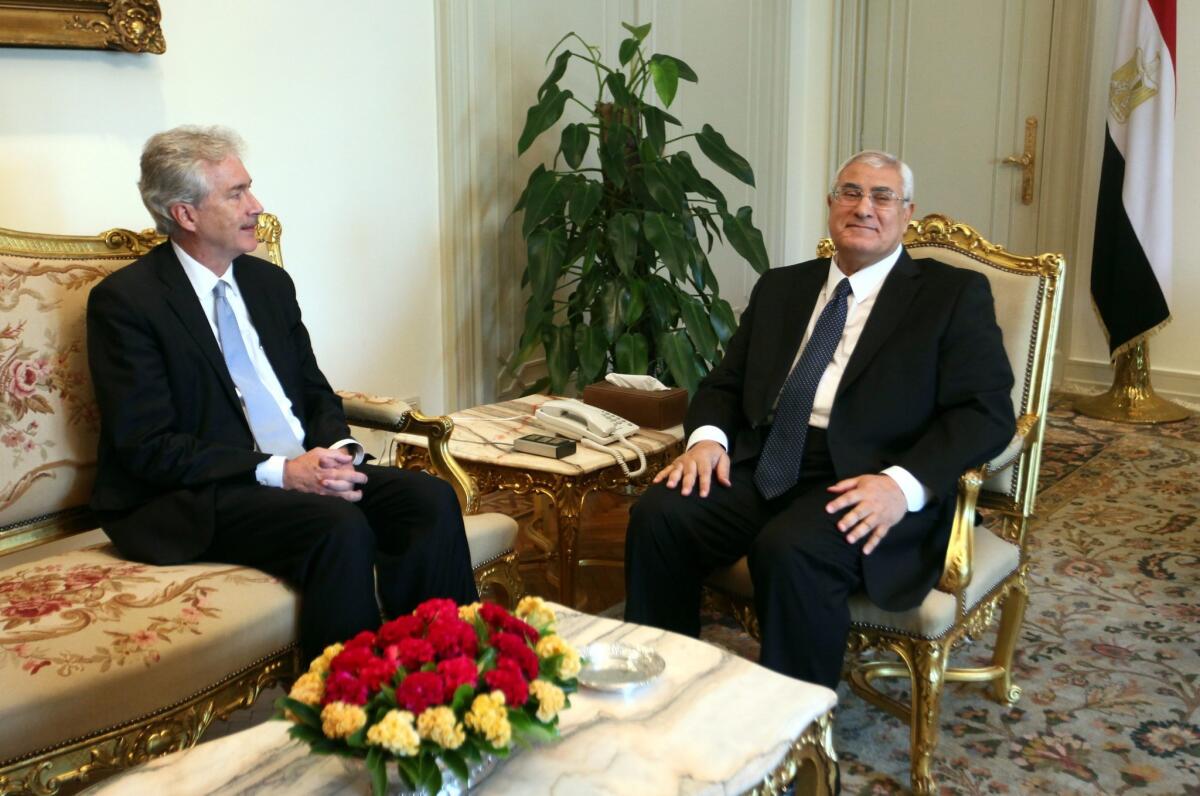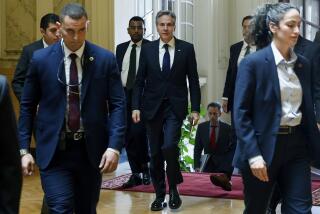U.S. envoy meets with Egypt’s interim leader

CAIRO -- A top U.S. diplomat met with Egypt’s interim leader Monday in the first high-level talks between the nations since a military coup ousted the Islamist former president.
The meeting between Deputy Secretary of State William J. Burns and the interim president, Judge Adly Mansour, came amid widespread anger at U.S. policy toward Egypt and ongoing protests demanding the former leader’s reinstatement.
Opening a two-day visit to Cairo, Burns also met with the head of Egypt’s armed forces, Gen. Abdel Fattah Sisi. He was also due to meet business and civil society leaders to press for “an end to all violence and a transition leading to an inclusive, democratically elected civilian government,” the State Department said.
The Obama administration has called for the Egyptian military to release the ex-president, Mohamed Morsi, who has been in detention since the July 3 coup, along with many other leaders of Morsi’s Muslim Brotherhood organization.
In what critics call a widening crackdown, Egypt’s top prosecutor on Sunday ordered the assets of several top Brotherhood officials frozen as part of an investigation into violence following Morsi’s ouster.
Egypt is badly divided between Morsi’s supporters and opponents, but many on both sides are furious at the United States.
Backers of Morsi, who won a narrow majority in Egypt’s first free presidential election last year, say the Obama administration has abandoned democratic principles by recognizing the military-backed interim government and refusing to halt $1.3 billion in annual aid to the armed forces.
Morsi’s opponents, who held massive demonstrations accusing him of running an Islamist dictatorship, have vilified the U.S. ambassador to Cairo, Anne Patterson, for comments before the coup that discouraged the protests and appeared to play down Morsi’s authoritarian tendencies.
The U.S. Embassy in Cairo, which was closed to the public for two weeks due to the unrest, reopened Monday but with a warning that the possibility of protests in the area remained.
Burns was not due to meet with any Muslim Brotherhood officials, who have vowed not to participate in any interim administration. The Brotherhood’s onetime allies, the ultraconservative Islamist Nour party, which backed the coup, also refused a meeting with Burns in protest of what it called U.S. interference in Egypt’s domestic affairs, according to the state-run Middle East News Agency.
ALSO:
Israel deports 14 Eritrean asylum-seekers
Israel in middle of legal tussle between U.S. and China
Francisco Vega officially wins Baja California governor’s race
shashank.bengali@latimes.com
Twitter/@SBengali
More to Read
Start your day right
Sign up for Essential California for news, features and recommendations from the L.A. Times and beyond in your inbox six days a week.
You may occasionally receive promotional content from the Los Angeles Times.







